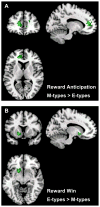An altered neural response to reward may contribute to alcohol problems among late adolescents with an evening chronotype
- PMID: 24144507
- PMCID: PMC3852171
- DOI: 10.1016/j.pscychresns.2013.08.005
An altered neural response to reward may contribute to alcohol problems among late adolescents with an evening chronotype
Abstract
Evening chronotypes not only differ from morning-types in their sleep and circadian timing, but they are prone to problematic outcomes involving reward function, including affective disturbance, sensation seeking, and substance involvement. We explored the neural mechanisms underlying these chronotype differences by comparing the neural response to reward in morning- and evening-types. Using a monetary reward fMRI paradigm, we compared the neural response to reward in 13 morning-types and 21 evening-types (all 20 y/o males). Region-of-interest (ROI) analyses focused on the medial prefrontal cortex (mPFC) and ventral striatum (VS), comparing the chronotype groups in these ROIs during anticipation and outcome conditions, and adjusting for time of scan. Chronotype groups were also compared on measures of sensation-seeking, substance involvement, and sleep quality. Evening-types reported significantly greater levels of alcohol dependence and worse sleep quality. Furthermore, evening-types showed an altered neural response to reward relative to morning-types, specifically, reduced mPFC reactivity during reward anticipation and increased VS reactivity during win outcome. In turn, less activation in the mPFC region in response to reward was associated with greater alcohol consumption, while increased activation in the VS in response to reward was associated with more symptoms of alcohol dependence. Increased reward-related problems among evening-types may be accompanied by altered neural responses to reward.
Keywords: Adolescence; Alcohol abuse; Brain imaging; Chronotype; Circadian rhythms; Sleep.
© 2013 Elsevier Ireland Ltd. All rights reserved.
Figures


References
-
- Adan A. Chronotype and personality factors in the daily consumption of alcohol and psychostimulants. Addiction. 1994;89:455–462. - PubMed
-
- Amir S, Stewart J. Motivational modulation of rhythms of the expression of the clock protein PER2 in the limbic forebrain. Biological Psychiatry. 2009;65:829–834. - PubMed
-
- Beck AT, Ward CH, Mendelson M, Mock J, Erbaugh J. An inventory for measuring depression. Archives of General Psychiatry. 1961;4:561–571. - PubMed
-
- Berridge KC, Robinson TE. Parsing reward. Trends in Neurosciences. 2003;26:507–513. - PubMed
Publication types
MeSH terms
Grants and funding
LinkOut - more resources
Full Text Sources
Other Literature Sources
Miscellaneous

